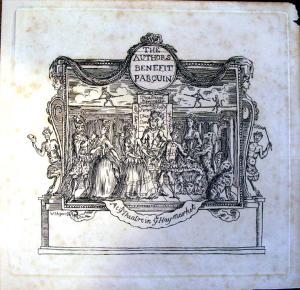This print appears to be an admission ticket for a benefit performance of Henry Fielding’s Pasquin, first performed in April 1736. It depicts a stage scene with seven performers, a dog and a cat, and in the background, two tightrope walkers accompanied by an ape; framed with a satyr on either side.
Originally attributed to William Hogarth (a friend and colleague of Fielding), the etching is a forgery. It was later attributed to Joseph Sympson, although that attribution is also questioned by some historians. In particular, Ronald Paulson wrote two different explanations for this print in Hogarth’s Graphic Works, if you look at both the 1965 and 1989 editions (Marquand Library (SA) ND497.H7 A35 and ND497.H7 A35 1989q).
Henry Fielding (1707-1754) was a British writer, playwright and journalist. His satirical comedy Pasquin; A Dramatick Satire On The Times Being The Rehearsal Of Two Plays: Viz., A Comedy Called The Election, And A Tragedy Called The Life And Death Of Common Sense, opened at London’s Haymarket Theatre.
A year earlier, Fielding had taken over management of the Little Theatre in the Haymarket and formed a company he called “Great Mogul’s Company of English Comedians.” That winter, he launched Pasquin to enormous success. His play was a brutal satire of the contemporary British government under Sir Robert Walpole, who retaliated with the Theatrical Licensing Act of 1737 and effectively ended Fielding’s brief West End career.
It may have been this political drama that built a market for the forged Fielding ticket.
